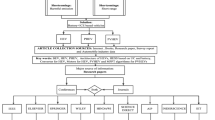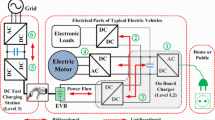Abstract
A hybrid energy storage system (HESS), which consists of a battery and a supercapacitor, presents good performances on both the power density and the energy density when applying to electric vehicles. In this research, an HESS is designed targeting at a commercialized EV model and a driving condition-adaptive rule-based energy management strategy (EMS) is proposed for the HESS, which takes into account the superiority achievement of each ESS and also the protection to each ESS. The effectiveness of the HESS plus the EMS compared to the single battery case is validated by both the computer simulation and the semi-physical rapid control prototype (RCP) test bench. An electric loading equipment is adopted in the RCP experiment validation for simulating the vehicle driving cycle instead of the traditional combination of a motor and a dynamometer. Both validation results show that compared to the single battery case, the working status of the battery is stabilized by the addition of the supercapacitor in the HESS case during both the propelling and regeneration modes and the battery energy is also saved. A dynamic degradation model for the battery is adopted in order to evaluate the life cycle cost of the HESS. Results show that the HESS plus the EMS has the effect of prolonging the battery lifetime and the HESS is economically effective compared to the single battery case.






















Similar content being viewed by others
References
Armenta, J., Núñez, C., Visairo, N., & Lázaro, I. (2015). An advanced energy management system for controlling the ultracapacitor discharge and improving the electric vehicle range. Journal of Power Sources, 284, 452–458.
Carter, R., Cruden, A., & Hall, P. J. (2012). Optimizing for efficiency or battery life in a battery/supercapacitor electric vehicle. IEEE Transactions on Vehicular Technology, 61(4), 1526–1533.
Song, Z., Hofmann, H., Li, J., Hou, J., Han, X., & Ouyang, M. (2014). Energy management strategies comparison for electric vehicles with hybrid energy storage system. Applied Energy, 134, 321–331.
Zhang, Q., Deng, W., Zhang, S., & Wu, J. (2016). A rule based energy management system of experimental battery/supercapacitor hybrid energy storage system for electric vehicles. Journal of Control Science and Engineering, 2016, 1–17.
Li, Y., Huang, X., Liu, D., Wang, M., & Xu, J. (2019). Hybrid energy storage system and energy distribution strategy for four-wheel independent-drive electric vehicles. Journal of Cleaner Production, 220, 756–770.
Li, J., Fu, Z., & Jin, X. (2017). Rule based energy management strategy for a battery/ultra-capacitor hybrid energy storage system optimized by pseudo spectral method. Energy Procedia, 105, 2705–2711.
Yan, M., Li, M., He, H., Peng, J., & Sun, C. (2018). Rule-based energy management for dual-source electric buses extracted by wavelet transform. Journal of Cleaner Production, 189, 116–127.
Florescu, A., Bacha, S., Munteanu, L., Bratcu, A. L., & Rumeau, A. (2015). Adaptive frequency-separation-based energy management system for electric vehicles. Journal of Power Sources, 280, 410–421.
Zheng, C., Li, W., & Liang, Q. (2018). An energy management strategy of hybrid energy storage systems for electric vehicle applications. IEEE Transactions on Sustainable Energy, 9(4), 1880–1888.
Long, B., Lim, S. T., Bai, Z. F., Ryu, J. H., & Chong, K. T. (2014). Energy management and control of electric vehicles, using hybrid power source in regenerative braking operation. Energies, 7(7), 4300–4315.
Santucci, A., Sorniotti, A., & Lekakou, C. (2014). Power split strategies for hybrid energy storage systems for vehicular applications. Journal of Power Sources, 258, 395–407.
Kim, N., Jeong, J., & Zheng, C. (2019). Adaptive energy management strategy for plug-in hybrid electric vehicles with pontryagin’s minimum principle based on daily driving patterns. International Journal of Precision Engineering and Manufacturing-Green Technology, 6(3), 539–548.
Zheng, C., & Cha, S. W. (2017). Real-time application of Pontryagin’s minimum principle to fuel cell hybrid buses based on driving characteristics of buses. International Journal of Precision Engineering and Manufacturing-Green Technology, 4(2), 199–209.
Song, Z. Y., Hofmann, H., Li, J. Q., Han, X. B., & Ouyang, M. G. (2015). Optimization for a hybrid energy storage system in electric vehicles using dynamic programing approach. Applied Energy, 139, 151–162.
Wang, B., Xu, J., Cao, B., & Ning, B. (2017). Adaptive mode switch strategy based on simulated annealing optimization of a multi-mode hybrid energy storage system for electric vehicles. Applied Energy, 194, 596–608.
Trovão, J. P., & Antunes, C. H. (2015). A comparative analysis of meta-heuristic methods for power management of a dual energy storage system for electric vehicles. Energy Conversion and Management, 95, 281–296.
Eckert, J. J., de Alkmin e Silva, L. C., Santiciolli, F. M., dos Santos Costa, E., Corrêa, F. C., & Dedini, F. C. (2018). Energy storage and control optimization for an electric vehicle. International Journal of Energy Research, 42, 3506–3523.
Wang, Bin, Jun, Xu, Cao, Binggang, & Zhou, Xuan. (2015). A novel multimode hybrid energy storage system and its energy management strategy for electric vehicles. Journal of Power Sources, 281, 432–443.
Trovão, J. P. F., Santos, V. D. N., Pereirinha, P. G., Jorge, H. M., & Antunes, C. H. (2013). A simulated annealing approach for optimal power source management in a small EV. IEEE Transactions on Sustainable Energy, 4(4), 867–876.
Trovão, J. P. F., Santos, V. D. N., Antunes, C. H., Pereirinha, P. G., & Jorge, H. M. (2015). A real-time energy management architecture for multisource electric vehicles. IEEE Transactions on Industrial Electronics, 62(5), 3223–3233.
He, H., Xiong, R., Zhao, K., & Liu, Z. (2013). Energy management strategy research on a hybrid power system by hardware-in-loop experiments. Applied Energy, 112, 131–1317.
Xiong, R., Duan, Y., Cao, J., & Quanqing, Y. (2018). Battery and ultracapacitor in-the-loop approach to validate a real-time power management method for an all-climate electric vehicle. Applied Energy, 217, 153–165.
Amjadi, Z., & Williamson, S. S. (2010). Power-electronics-based solutions for plug-in hybrid electric vehicle energy storage and management systems. IEEE Transactions on Industrial Electronics, 57(2), 608–616.
Cao, J., & Emadi, A. (2012). A new battery/ultracapacitor hybrid energy storage system for electric, hybrid, and plug-in hybrid electric vehicles. IEEE Transactions on Industrial Electronics, 27(1), 122–132.
Lukic, S.M., Wirasingha, S.G., Rodriguez, F., Cao, J., Emadi, A. (2006). Power management of an ultracapacitor/battery hybrid energy storage system in an HEV. In IEEE Vehicle Power and Propulsion Conference, (Windsor, UK).
https://www.bmwusa.com/vehicles/bmwi/i3/sedan/pricing-features.html.
Preda, I., Covaciu, D., Ciolan, G. (2010). Coast down test—theoretical and experimental approach. In International Automotive Congress.
https://www.energy.gov/sites/prod/files/2017/08/f36/FY16%20EDT%20Annual%20Report_FINAL.pdf.
Jongryeol, J., Wonbin, L., Namdoo, K., Kevin, S., Aymeric, R. (2017). Control analysis and model Validation for BMW i3 range extender. SAE Technical Paper 2017-01-1152.
Dixon, J., Nakashima, I., Arcos, E. F., & Ortuzar, M. (2010). Electric vehicle using a combination of ultracapacitor and ZEBAR battery. IEEE Transactions on Industrial Electronic, 57(3), 943–949.
Wang, L., Collines, E. G., & Li, H. (2011). Optimal design and real-time control for energy management in electric vehicles. The IEEE Transactions on Vehicular Technology, 60(4), 1419–1429.
Hredzak, B., Agelidis, V. G., & Jang, M. (2014). A model predictive control system for a hybrid battery-ultracapacitor power source. IEEE Transactions on Industrial Electronic, 29(3), 1469–1479.
Golchoubian, P., & Azad, N. L. (2017). Real-time nonlinear model predictive control of a battery-supercapacitor hybrid energy storage system in electric vehicles. IEEE Transactions on Vehicular Technology, 66(11), 9678–9688.
http://www.catarc.org.cn/upload/201808/01/201808011133125858.pdf
Acknowledgement
This research was supported by Shenzhen Science and Technology Innovation Commission (Grant Nos. KQJSCX20180330170047681 and JCYJ20180507182628567), National Key Research and Development Program of China (Grant No. 2016YFD0700602), National Natural Science Foundation of China (NSFC) (51707191), Chinese Academy of Sciences PIFI program (2021VEB0001), and Shenzhen Key Laboratory of Electric Vehicle Powertrain Platform and Safety Technology.
Author information
Authors and Affiliations
Corresponding author
Additional information
Publisher's Note
Springer Nature remains neutral with regard to jurisdictional claims in published maps and institutional affiliations.
Rights and permissions
About this article
Cite this article
Zheng, C., Wang, Y., Liu, Z. et al. A Hybrid Energy Storage System for an Electric Vehicle and Its Effectiveness Validation. Int. J. of Precis. Eng. and Manuf.-Green Tech. 8, 1739–1754 (2021). https://doi.org/10.1007/s40684-020-00304-5
Received:
Revised:
Accepted:
Published:
Issue Date:
DOI: https://doi.org/10.1007/s40684-020-00304-5




